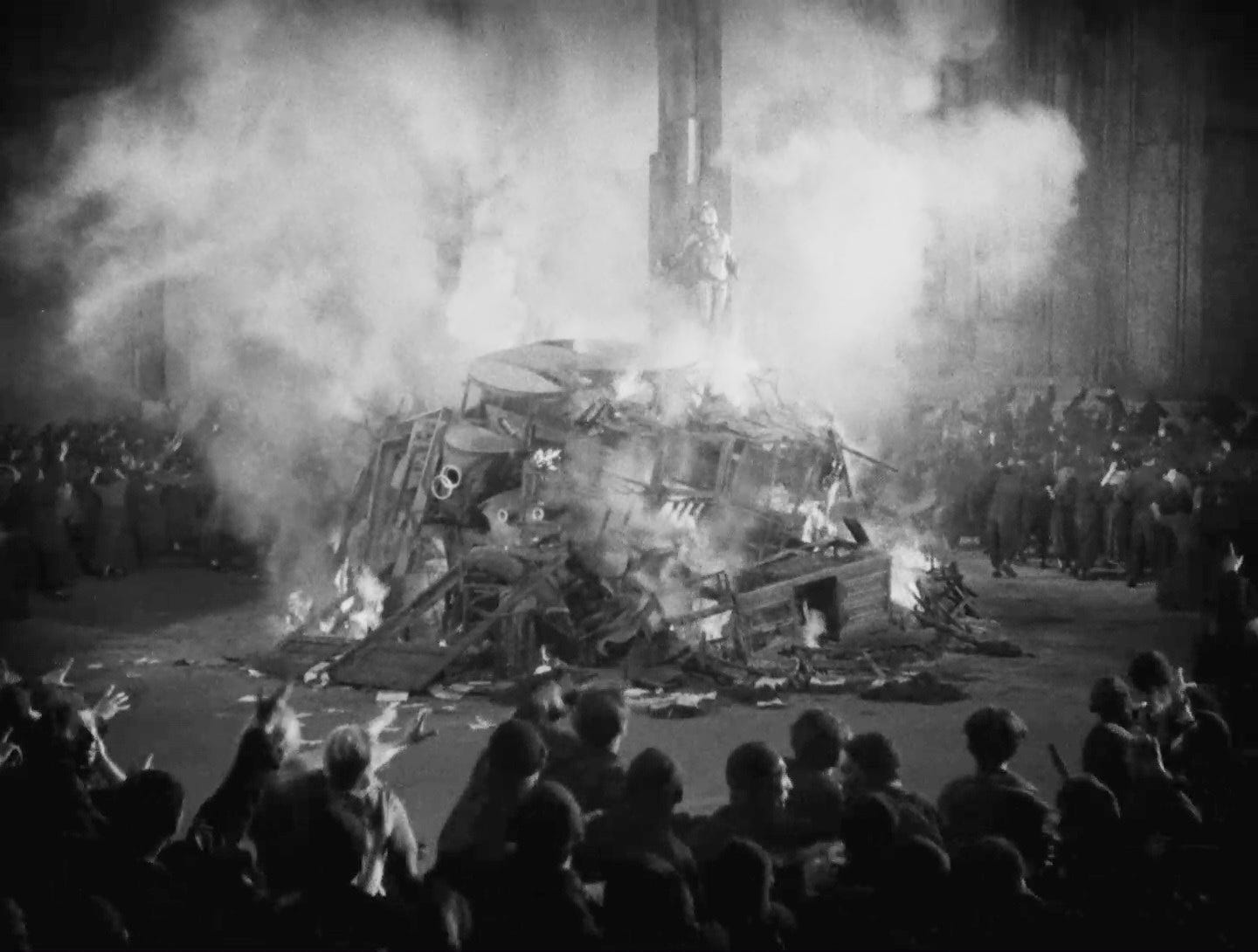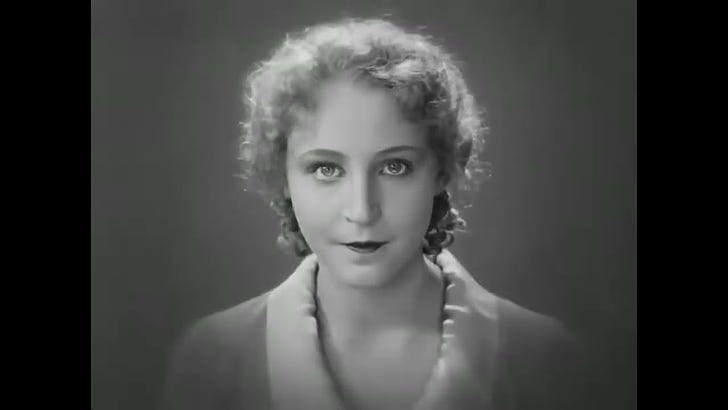This piece is part of my ongoing translation of the novel of Thea von Harbou’s “Metropolis”. If you’d like to find out more about the project and see other available chapters, check out the essay below:

Freder! Grot! Freder!” Josaphat shouted so loud that his voice cracked, and he raced with the leaps of a harried wolf through passages and over steps within the great pumpworks. His shouts were not heard. In the machine-halls were wounded engines in agony, wanting to obey and not being able to. The door was closed. Josaphat hammered against it with his fists and with his feet. It was Grot who opened it for him, revolver in hand.
“What in the name of seething hell...”
“Get out of the way! Where’s Freder?”
“Here! What’s the matter?”
“Freder, they’ve taken Maria captive!”
“What?”
“They’ve taken Maria captive and they’re killing her!”
Freder reeled. Josaphat dragged him to the door. Grot stood like a log in the way, staring, his arms hanging and lips babbling.
“The woman who destroyed my machine?”
“Shut your mouth, you fool—out of the way!”
“Grot!” A sound, half-born of madness.…
“Yes, Mr. Freder!”
“Stay here with the machines!”
“Yes, Mr. Freder!”
“Let’s go, Josaphat!”
Running, running, moving away spookily.
Grot turned around. He saw the paralysed machines. He reached out with his fist and struck the machine with the full might of it, like one strikes a stubborn horse between the eyes.
“The woman,” he shouted with a howl, “who saved my little children!” And he flung himself with grinding teeth at the machine.
***
“Tell me more,” said Freder, almost softly. It was as if he did not want to waste an atom of strength. His face was a white stone in which his two eyes flamed like jewels. He jumped to the wheel of the small motor-car in which Josaphat had come, for the pumpworks lay at the extreme end of the great Metropolis.
It was still night. The motor-car started up silently.
“We’ll have to make a nasty diversion,” said Josaphat, fixing the mirrors. “Many of the bridges between the blocks of houses are blown up.”
“Tell me more,” said Freder. His teeth hit against one another, chattering, as if he were freezing.
“I don’t know who discovered it. Probably the women who were thinking of their children and wanted to go home. You can’t get anything out of those raging people. But this much is certain: When they saw the black water rushing towards them from the shafts of the underground railway, and when they’d realised that, in the silencing of the machines, the pumpworks—the protector of their city—had been destroyed, they then went mad in their despair. It’s said that some mothers, blind and deaf to all reason, tried as if possessed to dive down through the flooded shafts. Purely through the horrible absolution of the futility of their rescue attempts, they’ve become beasts and they crave vengeance...”
“Vengeance on whom?”
“On the girl who seduced them.”
“On the girl?”
“Yes.”
“Keep going.”
“Freder, the engine can’t keep up at that speed.”
“Keep going!”
“I do not know how it came to be that the girl ran straight into their hands. I was on my way to you when I saw a woman running, with her hair flying, across the Cathedral square, the roaring hordes behind her. All hell broke loose tonight. The Gothics are snaking through the city, lashing themselves, and they’ve thrown the monk Desertus on a cross. They’re preaching that Judgement Day has come, and it seems that they’ve converted many already, for September is crouching before the smoking ruins of Yoshiwara. A troop of torch dancers joined up with the flagellants and, with foaming curses upon the Mother of Abominations, the great whore of Babylon, they burned Yoshiwara to the ground.”
“The girl, Josaphat!”
“She did not reach the Cathedral, Freder, where she wished to escape to. They caught up with her on the staircase because she fell on the steps, her dress hanging down in shreds on her body. A woman, whose white eyes glowed with insanity, cried out, like one seized with the spirit of a vision: ‘Look! Look: the saints have climbed down from their pedestals and will not let the witch into the Cathedral.’”
“And?”
“And they erected a stake before the Cathedral on which to burn the witch...”
Freder said nothing. He bent down lower. The motor-car groaned and jumped.
Josaphat clenched his hands into Freder’s arm. “Stop, for God’s sake!”
The motor-car stopped.
“We must go further to the left. Don’t you see? The bridge is gone!”
“The next bridge?”
“It’s impassable!”
“Listen...”
“What am I supposed to hear?”
“Shrieks… distant shrieks...”
“I don’t hear anything.”
“But you must be able to hear it!”
“Don’t you want to keep driving, Freder?”
“And do you not see that the air over there is becoming bright red?”
“From torches, Freder.”
“Torches don’t burn that brightly!”
“Freder, why are we wasting time here?!”
Freder did not answer. He was staring at the shreds of the iron bridge which dangled down into the ravine of the street. He must cross over, yes, he must cross over to get to the Cathedral by a shorter route.
The girders of a ripped-open tower had fallen over from this side of the street to the other, glistening metallically in the uncertain light of the fading night.
“Get out,” said Freder.
“Why?”
“Get out, I say!”
“I want to know why!”
“Because I’m driving across there...”
“Across where?”
“Across the girders.”
“Drive across?!”
“Yes.”
“That’s suicide, Freder!”
“I’ve not asked you to accompany me. Get out!”
“I won’t allow it! It’s blazing lunacy!”
“The stake over there is blazing, man!”
The words seemed not to come from Freder’s mouth. Every wound of the dying city seemed to be roaring out of him.
“Drive on,” said Josaphat through clenched teeth. The motor-car gave a jolt. It climbed. With an evil, treacherously unnatural sound, the narrow irons received the sucking, sliding wheels.
Blood trickled from Freder’s lips.
“Don’t brake, don’t brake—for God’s sake, don’t brake!” squealed the man beside him, making a grip of madness at Freder’s hands. The motor-car, already half in a skid, shot forward again. A split in the girders—over, across. Behind them, the dead girders crashed into the abyss with a screaming sound.
They reached the street on other side with a momentum which could no longer be hampered. The wheels whirred into blackness and nothingness. The motor-car overturned. Freder fell, then sprang up again. The other remained lying down.
“Josaphat!”
“Run! It’s nothing! By God, it’s nothing!” A contorted smile was upon the white face. “Think of Maria—run!”
And Freder ran.
Josaphat turned his head. He saw the blackness of the street flashing bright red. He heard the screams of the thousands. He thought dully, with a thrust of his fist in the air: Now I’d like to be Grot, so I can swear properly! Then his head fell back into the rubble on the street, and all consciousness, except that of pain, waned.
Freder, however, ran like he’d never run before. It was not his feet which carried him. It was his frantic heart and his thoughts. Streets and stairs and streets and, at last, the Cathedral square. Black in the background, the Cathedral, undeified, unlit, and the square before the broad steps swarming with people—and in the middle of them, surrounded by the yelps of madly-despairing laughter, the howling of furious songs, the smouldering of torches and fires, high up on the woodpile…
“Maria!”
Freder fell on his knees as though he’d been hacked through his tendons.
The girl he took to be Maria raised her head. She sought him out. She found him with her gaze. She smiled, and laughed.
“Dance with me, my dearest!” flew her voice, sharp as a flashing knife, through the uproar.
Freder pulled himself together. The masses recognised him. They sloshed towards him, shrieking and yelling.
“Oh ho! Joh Fredersen’s son! Joh Fredersen’s son!”
They wanted to grab him. He dodged them wildly. He threw himself so his back was against the railing of the street.
“Why do you want to kill her, you devils? She saved your children!”
A roaring laughter answered him. Women sobbed with laughter and bit their own fists.
“Yes, yes—she has saved our children! She saved our children with the song of the dead machines! She saved our children with the ice cold water! We should praise her—give her three cheers!”
“Just go to the Club of the Sons, your children are there!”
“Our children are not in the Club of the Sons! That’s where the brood hatched of money live. Sons of your kind, you dog in white-silk skin!”
“Listen, for God’s sake—listen to me!”
“We don’t want to hear anything!”
“Maria, beloved! Beloved!”
“Don’t whine, son of Joh Fredersen! Otherwise we’ll stomp on your mouth!”
“Kill me, if you must kill, but let her live!”
“One after the other, son of Joh Fredersen! First you shall see how your beloved dies a beautiful, hot, splendid death!”
A woman—Grot’s wife—tore a strip off her skirt and bound Freder’s hands. Then he was bound firmly to the railings with ropes. He fought back like a wild beast, shouting that the veins of this throat were at risk of bursting. Bound, powerless, he threw back his head into his neck and saw the sky over Metropolis, pure, tender, and greenish-blue, for morning would soon follow after this night.
“God!” he shouted, trying, in his bonds, to throw himself on his knees. “God, where art Thou?”
A wild red gleam fell on his eyes. The woodpile flared up in long flames. The men and the women joined hands and rushed around the stake, faster and faster, in rings growing wider and wider, laughing, screaming with stamping feet, “Witch! Witch!”
Freder’s bonds tore. He fell over on his face between the feet of the dancers.
The last he saw of the girl, while her dress and hair stood blazing around her as a mantle of fire, was the loving smile and the wonder of her eyes—and her mouth of deadly sin, which beckoned amongst the flames: “Dance with me, my dearest! Dance with me!”
< Chapter 19 = = = = = = = = = = = Chapter 21 >



